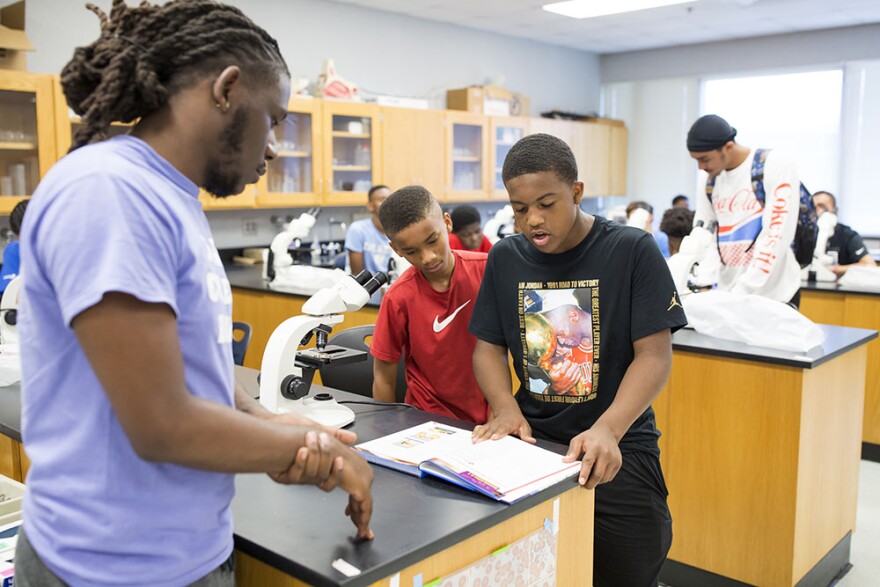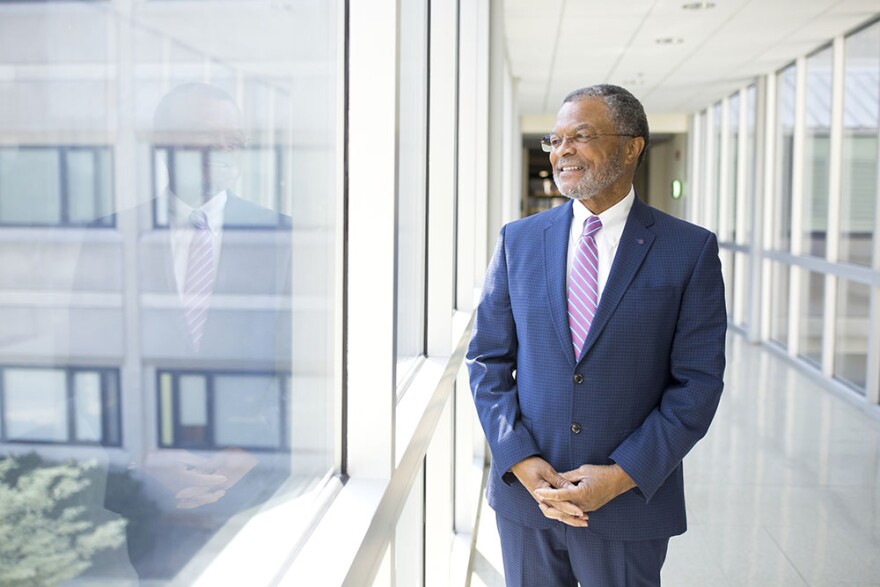During the regular school year, Ty Mathis is a math and science teacher in the Alamance-Burlington School System. This summer, he's teaching mostly middle school African-American boys at a Bridge to Medical School Camp in Graham. The camp is designed to encourage boys of color to consider medical school.
“Where is my illuminator? That’s our light source. Where’s my stage and then stage clip?" says Mathis on a recent afternoon while standing in the front of a sciene lab at Alamance Community College. "Good job.”

Mathis wears a t-shirt that reads “I Am College Bound” as he gives instructions, passing out blue rubber gloves. The boys are about to look at the cells in a slice of onion under the microscope. They use a mixed curriculum developed by Carolina Biological Supply Company of Burlington and Smithsonian Science and Technology Concepts Middle School (STCMS). one of the boys, KJ Clary, reads the instructions.
“Obtain a piece of sliced onion from your teacher. Put on your safety goggles and gloves, then follow the steps in figure 2.5 to prepare a wet mount slide of an onion leaf," said KJ, 13.
And they’re off. KJ and the others look closely at their onion slice, wet with iodine.
For many, the camp is helping them think about what they want to be when they grow up.
"As of now, I want to be in the NBA but if that doesn’t work, then I want to do sports medicine, so I can still be involved in sports," said KJ, wearing a t-shirt with Michael Jordon on the front.
The Association of American Medical Colleges reports that between 1986 and 2015, African-American female medical school graduates increased by 53%, while the number of African-American male medical school grads dropped by nearly 40%.

While physicians are not required to state their race or ethnicity, the North Carolina Medical Board shows that as of December 31, 2018, only 3.7% of the state’s 39,035 licensed physicians were African-American men, according to the board’s Communications Director Jean Brinkley.
Algie Gatewood, president of Alamance Community College, says he has always been concerned with the skills gap, education gap and poverty gap black boys have faced. With the Medical School Camp for middle school boys, Gatewood says he wants to also close the “belief gap."
“There are a lot of African-American students who do not believe they belong in a medical school. For that matter, they don’t believe they belong in dental school or in college," said Gatewood, who is African American. "And so that is part of what this program does. It helps to address the 'belief gap'."
There are a lot of African-American students who do not believe they belong in a medical school. For that matter, they don't believe they belong in dental school or in college. And so that is part of what this program does. It helps to address the belief gap. -Algie Gatewood
Gatewood says there are signs this camp is working.
“They have the opportunity to interface with African-American males who have been successful, who are in the medical field. And they begin to say, 'Wait a minute, this is possible. I can do this'," said Gatewood.
This is the camp's third year, and enrollment has almost doubled. Most of the boys are African American, but there are also boys who are Hispanic, Asian, and Native American. Some of the boys have attended all three years, like 15-year-old Jaylen Haith.
“It started off as my mom making me come my first year," said Jaylen, with a smirk. "But then I started finding the activities more and more fun and said, 'Mom I want to come back next year'.”
Jaylen says it has been exciting dissecting frogs and holding a human brain in his hands. He says he wants to be a doctor someday. He says until he started attending the camp, he didn't have any role models who were doctors or in the medical field.
“It was really like Charles Drew, and then I started looking at doctor TV shows, they are not real doctors but they do doctor-like things," said Jaylen. "I used to play with doctor toys and everything.”
Dr. Charles Drew was a renowned African-American doctor who specialized in blood preservation in the 1940s, creating the national blood collection program for the Red Cross. He died in a car crash in Alamance County in 1950.

A major part of this summer’s three-week medical school summer camp is a one-week visit to the UNC Chapel Hill medical and dental schools, where the kids will meet professionals who look just like them.
Lakeisha Vance is director of the summer camp and former department head for Information Technologies at ACC. Vance says jokingly, she should be working on her doctorate degree this summer, but she can't stay away from the camp and the boys.
"They’re happy. They’re learning. I see them doing things that you don’t typically see kids do," said Vance. "The day-to-day success, them thinking about college. And then the ultimate success would be them choosing a medical, dental, pharmacy career, even a STEM related career where we know there is a lot of need and great opportunities."
In 2013, the American Medical Association launched its "Accelerating Change in Medical Education Initiative." It is a roadmap to help medical schools "provide an environment where physicians-in-training from diverse backgrounds will thrive."
But first, you have to get the diverse pool of students to medical school -- and that's something the Bridge to Medical School Camp is working to do.
ADDITIONAL PHOTOS:














